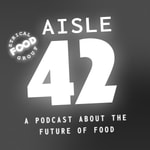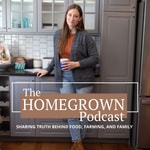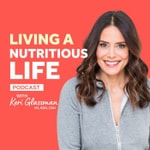Aisle 42 – Détails, épisodes et analyse
Détails du podcast
Informations techniques et générales issues du flux RSS du podcast.

Aisle 42
Ethical Food Group | Corwin Hiebert
Fréquence : 1 épisode/11j. Total Éps: 56

If you give a damn about the food you eat and how it's made then you’ll love Aisle 42—where we take a deeper look at what’s inside our shopping carts. Go behind the scenes of the food and beverage industry with Corwin Hiebert (Ethical Food Group) as he talks with mission-driven founders, retailers, and experts about fixing our broken food system and redefining the future of the grocery store, where the organic section is gone and the aisles are filled with sustainable food that's good for people and the planet.
Classements récents
Dernières positions dans les classements Apple Podcasts et Spotify.
Apple Podcasts
🇨🇦 Canada - food
15/07/2025#93🇨🇦 Canada - food
14/07/2025#72🇨🇦 Canada - food
13/07/2025#35🇨🇦 Canada - food
06/07/2025#93🇨🇦 Canada - food
05/07/2025#65🇨🇦 Canada - food
04/07/2025#47🇨🇦 Canada - food
27/06/2025#87🇨🇦 Canada - food
26/06/2025#62🇨🇦 Canada - food
08/06/2025#90🇨🇦 Canada - food
07/06/2025#65
Spotify
Aucun classement récent disponible
Liens partagés entre épisodes et podcasts
Liens présents dans les descriptions d'épisodes et autres podcasts les utilisant également.
See all- https://www.middaysquares.com/
78 partages
- https://www.theprettyuglycompany.com/
16 partages
- https://www.ranchogordo.com/
14 partages
- https://www.instagram.com/madewithlocal
7 partages
- https://www.instagram.com/themikefata
7 partages
- https://www.instagram.com/miyokoschinner
4 partages
- https://www.facebook.com/madewithlocal
4 partages
- https://www.facebook.com/nutsforcheese
3 partages
Qualité et score du flux RSS
Évaluation technique de la qualité et de la structure du flux RSS.
See allScore global : 73%
Historique des publications
Répartition mensuelle des publications d'épisodes au fil des années.
Krista Pineau | EcoCERT Canada
Saison 1 · Épisode 39
jeudi 22 août 2024 • Durée 24:31
Each and every episode of Aisle 42 highlights the intersections between sustainable food and beverage making, the industry the supports them and consumers that give a damn about our health and the world around us.
In this conversation with Krista from EcoCERT Canada we cover some really interesting ground around food growing and manufacturing, biodiversity, respect for the planet, and how ethical practices can impact the souls of those behind our food supply chain.
We'll also delve into the wonderful world of Fair for Life certification.
Whether you're curious about how certification processes work or interested in how they impact the food you buy, this episode will make you think differently about your next trip to the grocery store.
To learn more about how Krista’s beloved certification is making the word a better place go to https://fairforlife.org.
To learn about who is behind this podcast go to: https://www.ethicalfoodgroup.com/podcast
Here’s a summary of this interview:
Vision for the Future Grocery Store: Krista imagines a grocery store that emphasizes diversity in food, packaging, and architecture, promoting sustainability and respect for people and the planet.
EcoCERT Overview: EcoCERT is an international certification body focused on sustainability, with a range of standards, including organic certifications and Fair for Life, among others.
Role of Certifications: Krista emphasizes the importance of certifications like Fair for Life in ensuring that products meet high environmental and social standards, particularly in fair trade practices.
Fair for Life Certification: This certification goes beyond traditional fair trade, emphasizing social and environmental responsibility, as well as robust relationships between producers and buyers.
Challenges in Consumer Understanding: Communicating the complexity of certifications like Fair for Life to consumers through a simple logo is a significant challenge, but it's crucial for transparency.
Importance of Diversity in the Supply Chain: Krista advocates for diversity across the entire supply chain, from sourcing and production to packaging and store design, to support sustainability.
Certification Standards and Global Consistency: Krista's role involves ensuring that certification standards are applied consistently worldwide, regardless of where the certified operations are located.
Audit and Label Fatigue: EcoCERT is aware of the challenges companies face with multiple certifications and audits, and they are working to streamline processes to reduce this burden.
Support for Smaller, Committed Brands: Fair for Life certification is more stringent and often appeals to smaller brands that are deeply committed to ethical practices.
Future of Fair for Life: While Fair for Life may not reach the mass marketing levels of other certifications, it remains a crucial standard for ensuring transparency and ethical practices in the food system.
Paul Tylla | Heal
Saison 1 · Épisode 38
vendredi 9 août 2024 • Durée 34:51
Holistic nutrition, delicious meal replacements, plant-based innovation, and the healing power of love, science, and determination - THAT’s what’s in store for you in this episode of Aisle 42 where I talk with Paul from Heal. If you’ve ever blended up some smoothie or vitamin powder and felt like your taste buds, body, and bowels deserve better… then you’re going to love this conversation.
And for those of you interested in this kinda stuff, yes - Heal is a part of our Ethical Food Group family.
To learn more about everything Paul and his team are up to visit https://drinkheal.ca/
To learn about who is behind this podcast go to: https://www.ethicalfoodgroup.com/podcast
Here’s a summary of this interview:
Introduction to Heel: Paul Tylla shares the inception of Heel, a plant-based nutrition product inspired by his personal experiences and commitment to providing better nutritional solutions for his loved ones.
Vision of Future Grocery Stores: Paul envisions a grocery store of the future filled with whole foods, sustainability, and an emphasis on quality over quantity, where food acts as medicine.
Personal Journey: Paul's journey into entrepreneurship began when he cared for the mother of his children, who was diagnosed with ALS. This experience led him to question the quality of nutritional products available for the sick.
Challenges in Product Development: Paul discusses the complexities of formulating a high-quality product that meets Health Canada's guidelines for meal replacement without using synthetic additives.
Focus on Health: Heel is designed for people who prioritize health, vitality, and longevity over mere appearance or performance enhancement.
Plant-Based Ingredients: The decision to make Heel plant-based was driven by a desire to avoid cheap fillers and to leverage the nutritional benefits of plants, reducing inflammation and promoting overall health.
Consumer Feedback: Consumers report feeling tangible benefits from using Heel, such as increased energy and improved well-being, due to the high bioavailability of the plant-based nutrients.
Product Versatility: Heel stands out for its ease of use, palatable taste, and lack of common issues like chalkiness found in other nutritional powders. It can be easily mixed with water or other beverages.
Commitment to Quality: Heel's formulation is rooted in a commitment to providing the best possible product, avoiding compromises on quality, and ensuring that every ingredient is beneficial.
Educational Mission: Paul emphasizes the importance of educating consumers about the benefits of plant-based nutrition and the holistic approach of integrating nature's intelligence into product development.
Richa Gupta | Good Food for Good
Saison 1 · Épisode 29
mercredi 5 juin 2024 • Durée 23:23
Years ago the International section held some remarkable discoveries but now the flavours and inspiration found it traditional plant-based recipes from around the world are found throughout the grocery store… even in the ketchup aisle.
On this episode of Aisle 42 I talk with founder Richa Gupta from Good Food for Good and we talk about her passion for family eating that’s full of variety and nutritious choices that everyone, even our kids, can enjoy.
We explore her innovative approach to creating convenient, wholesome pantry staples that are packed with organic ingredients, free from added sugars, soy, corn syrup, gluten, dairy, or preservatives.
She walks us through her Whole 30 approval approach.
We talk about our favourite Indian, Mexican and Italian sauces and we cover some really important ground with their Buy One, Feed One initiative.
You’re going to love listening in.
To learn more about these amazing plant-based sauces visit https://goodfoodforgood.ca.
To learn more about the makers of this podcast go to: https://www.ethicalfoodgroup.com/podcast.
Here’s a summary of this interview:
Introduction and Connection: Corwin Hiebert and Richa Gupta finally connect after meeting at food shows, excited to discuss Good Food for Good's impact.
Vision for Future Grocery Stores: Richa envisions grocery stores full of fresh produce, recipe cards, and videos to inspire and educate customers on using fresh ingredients.
Nutrition and Variety: Emphasizes the importance of variety in diets for gut health, aiming for 40 different plants a week compared to the average 10.
Product Line Overview: Good Food for Good offers condiments like ketchups and BBQ sauces with no added sugar, Indian and Mexican sauces, and a unique pumpkin seed pasta sauce for added plant-based protein.
Whole 30 Approved: Discusses the Whole 30 approval for their products, aligning with their philosophy of avoiding sugar and artificial ingredients.
Commitment to Organic Ingredients: The challenge and importance of maintaining a 100% organic product line, emphasizing the benefits for both humans and the planet.
Buy One, Feed One Initiative: For every product purchased, a meal is provided to a person in need through partnerships with food banks in Canada, India, and the US, having donated over two million meals.
Packaging Choices: The decision to use glass jars instead of plastic to reduce waste and promote reusability, despite higher costs and lower recycling rates.
Popular Products: Their ketchup is the best-seller, praised for its taste and lack of added sugars, with children being a key test market.
Expansion and Availability: Good Food for Good products are available across Canada and the US in major retailers like Whole Foods, Loblaw, Safeway, and online markets.
Shelby Taylor | Chickapea
Saison 1 · Épisode 28
mercredi 29 mai 2024 • Durée 27:03
Pasta night is a family favourite for a lot of us but you’d be surprised to learn that pasta is also good for your mental health—that’s right, pasta has been scientifically proven to make you happier - so we're told.
In this episode of Aisle 42 we talk with Shelby Taylor from Chickapea—a dried pasta and meal kit company that transforms chickpeas and yellow peas into delicious entrees that are high in protein and fibre, and low in fat.
We talk about ingredients, flavours, the importance of texture, and we go behind the scenes of their work in the community, their Bcorp certification and their commitment to sustainability.
Learn more about this amazing pasta and where to buy it at https://chickapea.ca/.
Get the scoop on who makes this podcast, and more importantly why, at https://www.ethicalfoodgroup.com/podcast.
Here’s a summary of this episode:
Introduction and Product Praise:
Corwin Hiebert begins the interview by expressing his admiration for Shelby Taylor's chickpea-based pasta, which his family loves.
Ideal Grocery Store Vision:
Shelby envisions a future grocery store where healthier, less processed foods are the norm and not separated into special sections.
Product Ingredients and Changes:
Initially made with chickpeas and lentils, the pasta has switched to using yellow peas for a texture closer to traditional pasta while maintaining high nutritional value.
Positive Feedback from Kids:
Shelby shares excitement about the positive feedback from kids and institutional spaces like daycares, highlighting the importance of familiar texture and taste.
B Corp Certification Challenges:
Shelby discusses the challenges and rewards of maintaining their B Corp certification, focusing on sustainability and the complexities of sourcing organic ingredients while keeping products affordable.
Farms for Change Program:
The Farms for Change program supports regenerative farming and supplies nutritious food to low-income communities, with significant donations from Shelby's company.
Women-Owned Business:
Shelby acknowledges the difficulties and inspiration of being a women-owned business, particularly in raising capital and maintaining certification.
Sustainable Packaging Choices:
The company prioritizes sustainability with recyclable cardboard boxes and small plastic windows to showcase their product, despite the challenges.
Market Presence:
Shelby lists various major Canadian grocery stores where their pasta can be found, reflecting on the growth and market acceptance of their product.
Commitment to Quality:
Despite the challenges, Shelby emphasizes their commitment to providing healthy, nutritious food and the importance of transparency and sustainability in their business practices.
Tara Tomulka & Megan Loach Tomulka | Rawcology
Saison 1 · Épisode 27
mercredi 22 mai 2024 • Durée 33:48
The snacking category is near and dear to our hearts as consumers and when we can indulge on nourishing, low-sugar goodies the guilt just melts away.
In this energetic conversation we chat with Tara and Megan from Rawcology and we talk about healthy eating habits, allergen and inflammation-free ingredients, we chat through all their delicious, grain-free granolas and plant-based snacks, and we get our organic mojo going too.
We also chat about the challenges of running a women-led business in the food industry and the power of community and consumer support for the future of the grocery store.
Visit https://rawcology.com to learn more about the snacks they make and where you buy them.
Learn more about the team behind the Aisle 42 podcast at https://www.ethicalfoodgroup.com/podcast.
Here's a summary of this episode:
Tara Tomulka and Megan Discuss Rawcology's Mission:
The co-founders of Rawcology, Tara and Megan, discuss their commitment to creating nourishing, allergy-friendly, and low-sugar food products with a focus on health and wellness.
Emphasis on Quality Ingredients:
They highlight the importance of selecting high-quality, organic ingredients that are beneficial for health and environmentally sustainable.
Vision for Future Grocery Stores:
Megan shares her vision for grocery stores as places of discovery where customers are educated about innovative ingredients and healthier eating habits.
Interactive Shopping Experience:
The concept of grocery stores as community hubs where customers interact and learn about food is emphasized, suggesting a more personalized shopping experience.
Challenges of Women-led Businesses:
The interview addresses the unique challenges faced by women in the business world, particularly in sectors dominated by men.
Supporting Women Entrepreneurs:
They discuss the importance of community support and consumer choices in promoting and sustaining women-led businesses.
Product Development and Innovation:
Details are provided about Rawcology's product lines, including grain-free granolas and plant-based snacks, and their approach to innovation in the food industry.
Health Benefits of Products:
The health benefits of their products are discussed, focusing on allergy-friendliness and the avoidance of inflammatory ingredients like seed oils.
Educational Role of Grocery Stores:
The role of grocery stores in educating consumers about health and nutrition is highlighted as a crucial element of their vision for the future.
Advocacy for Organic and Sustainable Practices:
Both founders advocate for more organic farming and sustainable practices within the food industry, emphasizing the need for consumer education on these topics.
Ari Davis & Katie Wookey | Simpla Foods
Saison 1 · Épisode 26
mercredi 15 mai 2024 • Durée 27:16
Yogurt is a beloved staple for many and for those of us shopping for the plant-based versions we’ve been through some tough times. But now the weird and wacky experimentations are behind us and great flavour and simple ingredients are in the mix.
In this episode of Aisle 42 we go behind the scenes of Simpla Foods with founders Katie and Ari. We talk about their delicious coconut-based yogurt, their sustainable packaging and plastic reduction program, transparency in ingredient sourcing, the importance of flavour and texture, the power of probiotics, and creating a healthier food system.
Trust us, their yogurt is remarkable, good for us, and the planet, and you’re going to love listening in. Plus, this the first time having co-founders on the show!
Learn more about this amazing yogurt at https://www.simplafoods.com.
Learn more about the host, Corwin Hiebert, and Ethical Food Group at https://www.ethicalfoodgroup.com/podcast.
Here’s a summary of the conversation:
Dream Grocery Store
Katie and Ari envision a future grocery store with primarily whole foods, abundant fruits and veggies, and clean-label products for trusted shopping experience.
Plant-Based Yogurt Evolution
The interview discusses the evolution of plant-based yogurt from its initial unpalatable versions to the current trend of simple, organic ingredients and creamy textures, exemplified by Katie and Ari's product.
Personal Journey to Yogurt Making
The founders' personal health struggles led them to explore food as medicine, specifically seeking plant-based alternatives. Unable to find authentic fermented coconut yogurt in Canada, they began making it themselves, eventually leading to their commercial venture.
Importance of Probiotics
Katie and Ari emphasize the importance of probiotics for gut health, noting the natural fermentation process in their yogurt, which retains live probiotics crucial for gut health.
Zero Sugar and Maple Syrup Sweetening
The founders explain the absence of sugar in their original yogurt and the minimal use of organic maple syrup in flavored varieties. They advocate for healthier options, stressing the detrimental effects of excessive sugar consumption on health.
Transition to Plant-Based Diet
They discuss the trend of consumers reducing dairy consumption and transitioning to plant-based eating. They speculate that in 50 years, plant-based yogurts may become as popular as dairy-based ones.
Ingredient Sourcing and Transparency: Katie and Ari emphasize transparency in their ingredient sourcing. They have direct trade relationships with suppliers, ensuring organic and fair-trade ingredients.
Packaging Innovation
Simpler Foods uses paperboard packaging with a thin plastic lining, significantly reducing plastic use compared to traditional yogurt containers. They also offset their additional plastic use through a partnership with Repurpose Global.
Product Availability
They are expanding nationally in Canada and can be found in stores like Whole Foods Market, Nature's Emporium, and Ambrosia. They offer a store locator on their website for consumers to find their products.
Chris Lerohl | UpRoot Food Collective
Saison 1 · Épisode 25
mercredi 8 mai 2024 • Durée 24:42
In this episode of Aisle 42, we chat with Chris Lerohl from UpRoot Food Collective. We cover a whole ranges of subjects like… his vision for the future of digital and local shopping, food innovation, quality ingredients, story telling, consumer trends, local food making and we talk about yummy dumplings and meat pies too.
To learn more about what Chris and his team are doing go to https://uprootfood.ca or https://honestdumplings.ca or https://southislandpie.ca.
To learn more about Corwin Hiebert and why the Aisle 42 podcast exists visit https://www.ethicalfoodgroup.com.
Here’s a summary of this interview:
Corwin Hiebert and Chris begin the podcast discussing technical setup and acknowledging this as their first podcast episode for Ethical Food Group (EFG). Chris's company is part of the Ethical Food Group family. They discuss the successful collaboration between their teams and the positive results from their collective efforts.
Vision for Future Grocery Stores
Chris imagines a grocery store with a focus on innovative products that have detailed ingredient stories and high quality.
Company Products
They produce gourmet Chinese-style dumplings and New Zealand-style meat pies under the brands Honest Dumplings and South Island Pies, featuring creative flavors and both regular and limited edition products.
Challenges of Scaling Quality
Discussion on maintaining product quality as production scales up, with comparisons to international standards like those in Japan.
Uproot Food Collective
Chris explains the role of their Uproot Food Collective in supporting local food brands, particularly during the pandemic, and the subsequent focus shift back towards their core products post-pandemic.
Local Food Economy and Sustainability
The importance of supporting local food economies, clean label products, and sustainability are emphasized.
Consumer Behavior and Direct-to-Consumer Sales
Chris discusses changes in consumer behavior, particularly the stability and benefits of direct-to-consumer sales, and the impact of food shows on their sales and consumer interaction.
Challenges in Meal Product Development
They touch on the regulatory and logistical challenges of developing meal-focused products that can meet consumer needs for convenient, nutritious options.
Celebrity Endorsement
Chris expresses a desire for a shoutout from "How to Dad," a popular New Zealand influencer, aligning with their brand's cultural and humorous aspects.
Conclusion
The interview wraps up with a discussion about the potential and importance of maintaining creativity and innovation in the food industry.
Marc Wandler | Susgrainable
Saison 1 · Épisode 24
mercredi 1 mai 2024 • Durée 33:39
It’s time to get your upcycling on! No, this is not a spin class… upcycling has nothing to do with riding a bike, what you’re about to hear a conversation with co-founder Marc Wandler from Susgrainable — he’s an energetic and inspiring entrepreneur who loves to talk about the circular food economy, the future of food waste, and baking delicious things that can dramatically improve our health.
In this episode we talk about how the grocery store could be a transformative experience, how his healthcare work played into his start-up venture, why it’s so important to have transparency throughout the food system, and how upcycling and localizing our food systems is so important. And yes, we talk about cookies and pancakes and banana bread made with flour that includes spent barley from beer making.
Learn more at https://susgrainable.com.
See who’s behind Aisle 42 at https://www.ethicalfoodgroup.com/podcast.
Here’s a summary of this episode:
Enhancing Customer Experience Through Technology: He advocates for using technology to improve efficiency and customer service, not just to save labor costs. This includes automated checkouts for convenience while maintaining traditional cashier interactions to preserve a personal touch.
Addressing Customer Needs: Marc emphasizes the importance of catering to various shopping needs, ranging from quick in-and-out visits to more immersive, event-like experiences.
Vision for a Better Food System: He discusses the decline in grocery shopping experiences over the past five years and calls for a collaborative effort among all players in the food industry to enhance customer satisfaction and streamline operations.
Sustainability and Upcycling: Marc's company focuses on sustainability by upcycling beer waste into barley flour, which is then used to create healthy, fiber-rich baking mixes. This not only reduces waste but also provides consumers with nutritious alternatives.
Impact of Personal Experience: Marc shares how his background in healthcare and aviation has influenced his approach to tackling inefficiencies and promoting sustainability in the food industry.
Future Plans and Challenges: He outlines the challenges and future plans for his business, including expanding the use of upcycled barley flour and enhancing its impact through further product development and market expansion.
Overall, Marc Wandler’s interview highlights his commitment to transforming the grocery shopping experience through innovation, sustainability, and a focus on customer satisfaction.
Saul Brown | Saul Good Gift Co.
Saison 1 · Épisode 23
mercredi 17 avril 2024 • Durée 25:16
The conversation you’re about to hear is an Aisle 42 first in that it’s with a retailer, well, sort of. We chat with founder Saul Brown of Saul Good Gift Company—a B-corp certified, Canadian gift giving business that’s focused on locally sourced, sustainable or handmade artisan goods that we can be proud to share with friends, family, co-workers and clients.
Saul talks about the environmental travesty that is the traditional gift basket industry, the importance personalization in our online shopping experiences, and how their approach not only supports local artisans and ethical food makers but also helps us convey deeper appreciation and connection through the gifts we give.
Find your next gift delivery at https://www.itsaulgood.com.
Learn more about this podcast (and why we make it) here: https://www.ethicalfoodgroup.com/podcast
Here’s a summary of the interview:
Saul Good Gift Company's Origins: Founded in 2006, the company emphasizes locally sourced, artisanal products, focusing on sustainability and eco-friendly practices.
B Corp Certification: Saul Good was among the first businesses in Canada to receive B Corp certification, demonstrating its commitment to social and environmental standards.
Impact of Pandemic on Consumer Awareness: The COVID-19 pandemic has heightened consumer awareness about the importance of supporting local businesses, a principle Saul Good has championed since its inception.
Innovative Retail Experiences: Saul reflects on changes in retail environments, like grocery stores experimenting with sensory adjustments such as dimming lights and reducing noise to create a peaceful shopping experience.
Role of Music in Retail: Saul discusses the influence of music in enhancing or detracting from the retail and advertising experience, emphasizing the need for a balanced approach.
Gift-Giving as a Relationship Tool: The company uses gift-giving to foster relationships, with a focus on values-aligned, sustainable practices that tell a meaningful story through the gifts.
Customer Demographics: Saul Good primarily serves a diverse customer base, with a significant proportion being professional women aged 30-50.
Supporting Local and Small Businesses: The company not only sources from local artisans but also engages in creating a network that supports these small businesses, enhancing the local economy.
Sustainable Practices in Focus: Ongoing efforts include redesigning packaging to reduce paper use by 67% and using 100% recycled materials, significantly lowering the company's environmental impact.
Future Challenges and Opportunities: Looking ahead, Saul discusses potential sustainability challenges related to packaging and shipping, considering innovative solutions like bike courier deliveries for local orders.
Oren Epstein | Bio Raw
Saison 1 · Épisode 22
jeudi 11 avril 2024 • Durée 21:46
Eating healthy at home is one thing but what about when we’re at the office, or on-the-go? When we make quick food, healthy food, good things happen.
This conversation is with Oren Epstein from Bio Raw—a B Corp certified, allergen-free, plant-based, certified organic ready-to-eat, meals and snacks service. Bio Raw aims to transform lives, the planet and the food industry — one radically good meal bowl, bio-bite, dressing and snack at a time.
To learn more go to https://www.bioraw.ca.
To learn about how Ethical Food Group is playing its part to fix the broken food system visit https://www.ethicalfoodgroup.com.
Here’s the highlights from this interview:
Bio Raw's Vision and Products:
Oren talks about the ideal future grocery store, emphasizing the importance of integrity, local sourcing, and avoiding harmful ingredients. Bio Raw creates organic, gluten-free, and nut-free convenience foods like pre-packaged meals, power puddings, high-protein bites, and salad dressings. Their products are designed to be healthy, delicious, and suitable for various dietary preferences.
Sustainability and Ethical Business Practices:
Epstein highlights Bio Raw's commitment to sustainability, including their use of plant-based packaging and efforts towards a zero-waste certification. He also discusses the significance of Bio Raw's B Corp certification, which verifies their dedication to social and environmental standards.
Challenges and Consumer Education:
Expanding the business and educating consumers about healthy choices and the pitfalls of the food industry are ongoing challenges. Epstein emphasizes the importance of educating customers on why Bio Raw's products are superior, focusing on the use of whole food ingredients and avoiding processed oils and allergens.
Allergen-Free and Safe Foods:
Bio Raw's commitment to offering gluten-free and nut-free options is driven by a desire to serve those with dietary restrictions safely. They go the extra mile by batch testing their products to ensure they meet these standards, providing peace of mind for consumers with allergies.
Future Goals and Expansion:
Epstein expresses a desire to expand Bio Raw's reach, making their products available in more locations to meet the demand for healthy, convenient, and allergen-free foods. He mentions the importance of supporting retailers and educating consumers to grow the brand.









